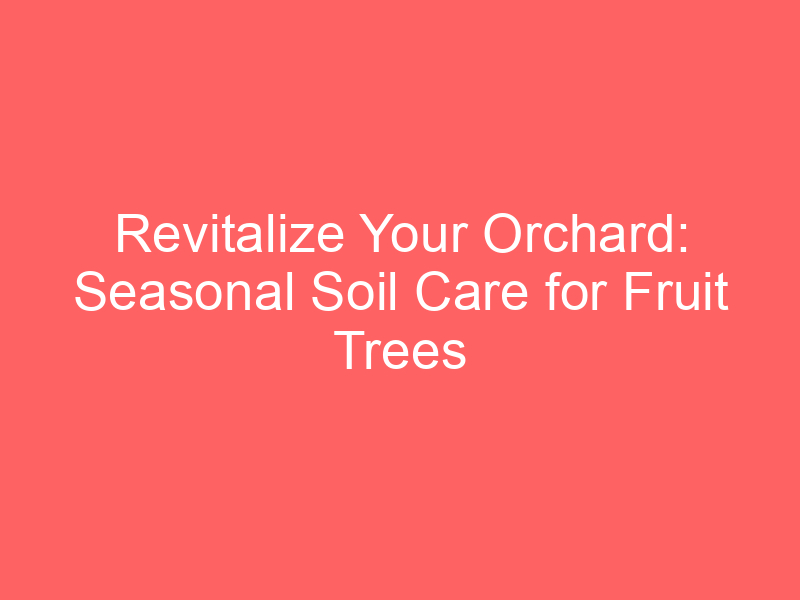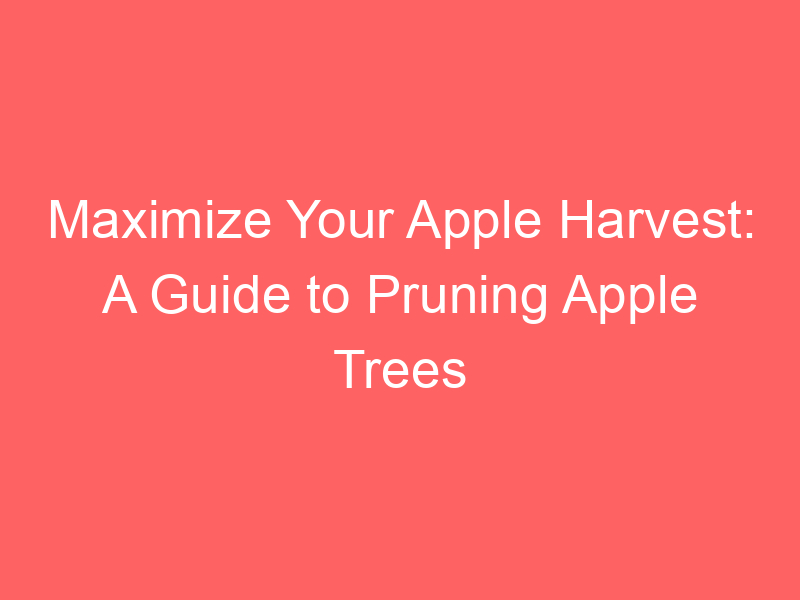Introduction to Seasonal Soil Care for Fruit Trees
When it comes to growing fruitful and healthy fruit trees, one of the most important aspects to consider is soil care. The soil is where your trees draw their nourishment, and its condition can significantly affect the health and productivity of your trees. In this section, we will delve into the importance of soil care for fruit trees and provide an overview of seasonal tree care.
- Understanding the Importance of Soil Care for Fruit Trees
- Overview of Seasonal Tree Care
Soil care is crucial for the growth and development of fruit trees. The soil provides essential nutrients that the trees need to grow and bear fruit. Without proper soil care, your trees may not get the nutrients they need, leading to poor growth and low fruit yield. According to a Wikipedia article on soil fertility, the fertility of the soil directly affects the health and productivity of the plants growing in it.
Seasonal tree care involves adjusting your care practices according to the changing seasons. Different seasons bring different conditions that can affect your fruit trees. For instance, spring is the best time for pruning and fertilizing, while fall is ideal for planting new trees. By understanding the needs of your trees in each season, you can provide the best care and ensure a bountiful harvest. A Wikipedia article on orchards provides more information on seasonal tree care.
In the following sections, we will delve deeper into the specifics of fruit tree soil care, seasonal soil preparation, and soil management. We aim to equip you with the knowledge you need to revitalize your orchard with seasonal soil care.
Understanding Fruit Tree Soil Care
Soil care is a crucial aspect of fruit tree cultivation. It is the foundation of a healthy and productive tree. Let’s delve into the basics of soil maintenance for fruit trees.
Basics of Soil Maintenance for Fruit Trees
Understanding the basics of soil maintenance is the first step towards ensuring the health and productivity of your fruit trees. Here are two important aspects to consider:
- Importance of soil quality for fruit tree health
- Key elements of soil care
The quality of the soil in which a fruit tree grows plays a significant role in its overall health and productivity. Healthy soil is rich in nutrients and has good water retention and drainage properties. It provides the tree with the necessary nutrients and water, promoting vigorous growth and a bountiful harvest. Poor soil quality, on the other hand, can lead to stunted growth, low fruit yield, and increased susceptibility to diseases and pests. Learn more about soil quality here.
Soil care for fruit trees involves several key elements, including soil testing, amendment, and proper watering. Soil testing helps determine the soil’s nutrient content and pH level, allowing for appropriate amendments. Amending the soil involves adding organic matter or fertilizers to improve its nutrient content and structure. Proper watering ensures the soil remains moist but not waterlogged, promoting healthy root development. Read more about soil fertility here.
Understanding and implementing these basics of soil maintenance can significantly improve the health and yield of your fruit trees. In the next section, we will discuss how to care for your fruit trees seasonally.
Caring for Fruit Trees Seasonally
Just like people, fruit trees have different needs in different seasons. By understanding these needs, you can provide the best care for your trees and ensure a bountiful harvest. Let’s explore the seasonal soil care tips for fruit trees.
-
Spring Soil Care Tips
In spring, your fruit trees awaken from their winter slumber and start a new growth cycle. This is the perfect time to prepare the soil for the growing season. Start by testing the soil’s pH level. Fruit trees prefer slightly acidic soil, with a pH between 6.0 and 7.0. If the pH is too high, you can lower it by adding sulfur. If it’s too low, lime will help raise it. Also, add a layer of compost to provide essential nutrients. Remember to keep the soil moist, but not waterlogged.
-
Summer Soil Care Tips
During the hot summer months, your main goal is to help your fruit trees conserve water. Mulching is a great way to achieve this. A layer of mulch around the base of your tree will help retain moisture, suppress weeds, and regulate soil temperature. Additionally, continue to monitor soil moisture levels and water your trees deeply and infrequently to encourage deep root growth.
-
Fall Soil Care Tips
Fall is the time to prepare your fruit trees for winter. Begin by removing any fallen fruit or leaves from the ground to prevent diseases. Then, add a layer of compost to replenish the nutrients in the soil. If your soil is heavy clay, consider adding gypsum to improve its structure and drainage. Finally, apply a layer of mulch to protect the roots from freezing temperatures.
-
Winter Soil Care Tips
Winter is a time of rest for fruit trees. During this period, limit watering and avoid fertilizing as this can stimulate new growth that could be damaged by frost. Instead, focus on protecting your trees from harsh winter conditions. Wrap the trunk with a tree wrap to prevent sunscald and frost cracks. Also, consider applying a dormant oil spray to control overwintering pests.
By following these seasonal soil care tips, you can create a nurturing environment for your fruit trees all year round. Remember, a healthy soil means a healthy tree, and a healthy tree means a plentiful harvest.
Seasonal Soil Preparation for Fruit Trees
One of the most crucial aspects of growing healthy and productive fruit trees is soil preparation. The quality of your soil can significantly affect the health and yield of your fruit trees. In this section, we will delve into the importance of organic soil care for fruit trees.
Organic Soil Care for Fruit Trees
Organic soil care is a sustainable and eco-friendly approach to maintaining the health and productivity of your fruit trees. It involves the use of organic materials and practices to enhance soil fertility and structure, promote beneficial soil life, and provide essential nutrients to your trees.
- Benefits of Organic Soil Care
- Organic Soil Care Methods
Organic soil care offers numerous benefits for your fruit trees. It enhances soil fertility and structure, making it easier for tree roots to absorb nutrients. It also promotes the growth of beneficial soil organisms, which contribute to nutrient cycling and disease suppression. Furthermore, organic soil care reduces the need for synthetic fertilizers and pesticides, making your home harvests safer and more sustainable.
There are several methods you can use to care for your soil organically. These include composting, mulching, green manuring, and crop rotation. Composting involves the decomposition of organic waste materials into nutrient-rich compost, which can be added to your soil to improve its fertility and structure. Mulching involves the use of organic materials like straw or wood chips to cover the soil surface, which helps to conserve moisture, suppress weeds, and improve soil quality. Green manuring involves the growth and incorporation of certain plants into the soil to improve its fertility and structure. Crop rotation involves the alternating planting of different crops to enhance soil fertility and prevent disease buildup.
By adopting organic soil care practices, you can ensure the health and productivity of your fruit trees while also contributing to environmental sustainability. Remember, a healthy soil equals a healthy tree, and a healthy tree yields a bountiful harvest.
Seasonal Soil Nutrients for Fruit Trees
Just like us, fruit trees need a balanced diet to stay healthy and productive. The type and quantity of nutrients your fruit trees need can change with the seasons. Let’s explore the essential nutrients for each season and how to supplement soil nutrients effectively.
- Essential nutrients for each season
During the spring, fruit trees need a boost of Nitrogen (N) to support their new growth. Phosphorus (P) and Potassium (K) are also essential for root development and disease resistance. In the summer, continue with a balanced N-P-K fertilizer but also include trace elements like Magnesium (Mg) and Calcium (Ca) which are crucial for fruit development. In the fall, reduce Nitrogen and increase Potassium to help trees prepare for winter. In the winter, trees are dormant and usually require no additional nutrients.
- How to supplement soil nutrients
Supplementing soil nutrients can be done in several ways. Organic compost is a great way to enrich your soil with nutrients and improve its structure. You can also use a balanced commercial fertilizer that contains the necessary N-P-K ratio. Always remember to follow the manufacturer’s instructions when applying fertilizers. Another effective method is to use mulch around the base of your trees. This not only helps retain moisture but also slowly releases nutrients into the soil as it decomposes.
Remember, the key to successful fruit tree care is regular soil testing. This allows you to understand what your soil is lacking and supplement it accordingly. A healthy soil leads to a healthy tree and a bountiful harvest.
For more detailed information on soil nutrients, you can visit Wikipedia’s page on Soil Fertility.
Fruit Tree Soil Management
Managing the soil in which your fruit trees grow is a crucial aspect of ensuring a healthy and bountiful harvest. Let’s delve into the specifics of soil care in different seasons.
Soil Care in Different Seasons
Just as the seasons change, so should your approach to soil care. Let’s explore how you can adjust your soil care strategies to align with each season and ensure your fruit trees thrive all year round.
- Adjusting soil care strategies for each season
- Examples of successful seasonal soil care
Each season presents unique challenges and opportunities for soil care. In spring, it’s important to prepare the soil for the growing season by adding compost or organic matter. Summer is the time to maintain soil moisture levels with regular watering and mulching. In fall, consider adding a layer of compost to replenish nutrients and protect the soil over winter. Finally, winter is the time for rest and preparation for the next growing season. This might involve testing the soil’s pH levels and making necessary adjustments.
Let’s look at some examples of how seasonal soil care can lead to a successful harvest. In the spring of 2018, a fruit tree grower in California reported a 20% increase in their apple harvest after implementing a soil care strategy that included adding compost in the spring and maintaining soil moisture throughout the summer. Similarly, an orchard in Washington saw a significant reduction in tree disease after they started testing and adjusting their soil’s pH levels each winter.
By understanding and adapting to the needs of your soil in each season, you can create an optimal environment for your fruit trees to flourish. Remember, a healthy soil leads to a healthy tree, and a healthy tree produces a bountiful harvest.
Fruit Tree Care Tips
As a plant lover, you understand the joy and satisfaction that comes from growing your own fruit trees. However, to ensure a bountiful harvest, there are certain do’s and don’ts you need to follow. Let’s delve into these crucial tips.
- Do’s and Don’ts of fruit tree care
- Common mistakes in fruit tree soil care
Do water your fruit trees regularly, especially during dry spells. However, avoid overwatering as it can lead to root rot. Do prune your trees to maintain their shape and promote better fruit production. Don’t forget to feed your trees with a balanced fertilizer to ensure they get all the nutrients they need. Avoid using pesticides unless absolutely necessary, as they can harm beneficial insects and the environment.
Many plant lovers make the mistake of not testing their soil before planting. This can lead to nutrient deficiencies or excesses that harm the tree. Another common mistake is not amending the soil with organic matter. Organic matter improves soil structure, water holding capacity, and nutrient availability. Over-fertilizing is another common mistake. While nutrients are essential for tree growth, too much can burn the roots and harm the tree.
Remember, every fruit tree is unique and may require slightly different care. Always research the specific needs of your tree and adjust your care routine accordingly.
By following these tips, you can ensure your fruit trees are healthy and productive, providing you with a delicious home harvest for years to come.
Conclusion: Revitalize Your Orchard with Seasonal Soil Care
As we wrap up this informative journey through the world of fruit tree soil care, it’s time to reflect on the key takeaways and the importance of seasonal soil care for your home orchard. Let’s recap the main points and look forward to a fruitful harvest.
- Recap of Key Takeaways
- Final Thoughts on the Importance of Seasonal Soil Care for Fruit Trees
Understanding the unique needs of your fruit trees and the soil they grow in is the first step towards a successful harvest. We’ve learned that different seasons require different soil care strategies, and that preparation and management are crucial.
From the introduction of the concept of seasonal soil care, to the detailed exploration of soil preparation and management, we’ve covered a lot of ground. We’ve learned that the health of your fruit trees is directly linked to the health of your soil, and that seasonal care is key to maintaining that balance.
Remember, the right soil pH, nutrient content, and moisture level can make all the difference in your fruit tree’s growth and productivity. Regular soil testing and amendments, such as compost and organic matter, can help maintain optimal soil health.
Seasonal soil care is not just about ensuring a good harvest for the current season, but also about preparing for the seasons to come. It’s about building a sustainable, healthy environment for your fruit trees to thrive in year after year.
By investing time and effort into understanding and implementing seasonal soil care, you are not just growing fruit trees, you’re cultivating an orchard that can provide you with fresh, homegrown fruit for years to come.
As Robert Louis Stevenson once said, “Don’t judge each day by the harvest you reap but by the seeds that you plant.” In the context of fruit tree care, the ‘seeds’ are your ongoing efforts in soil care. The ‘harvest’ is not just the fruit you reap, but the satisfaction of knowing you’ve nurtured a healthy, productive orchard.
With the knowledge you’ve gained from this guide, you’re now equipped to revitalize your orchard with seasonal soil care. Here’s to a bountiful harvest!





